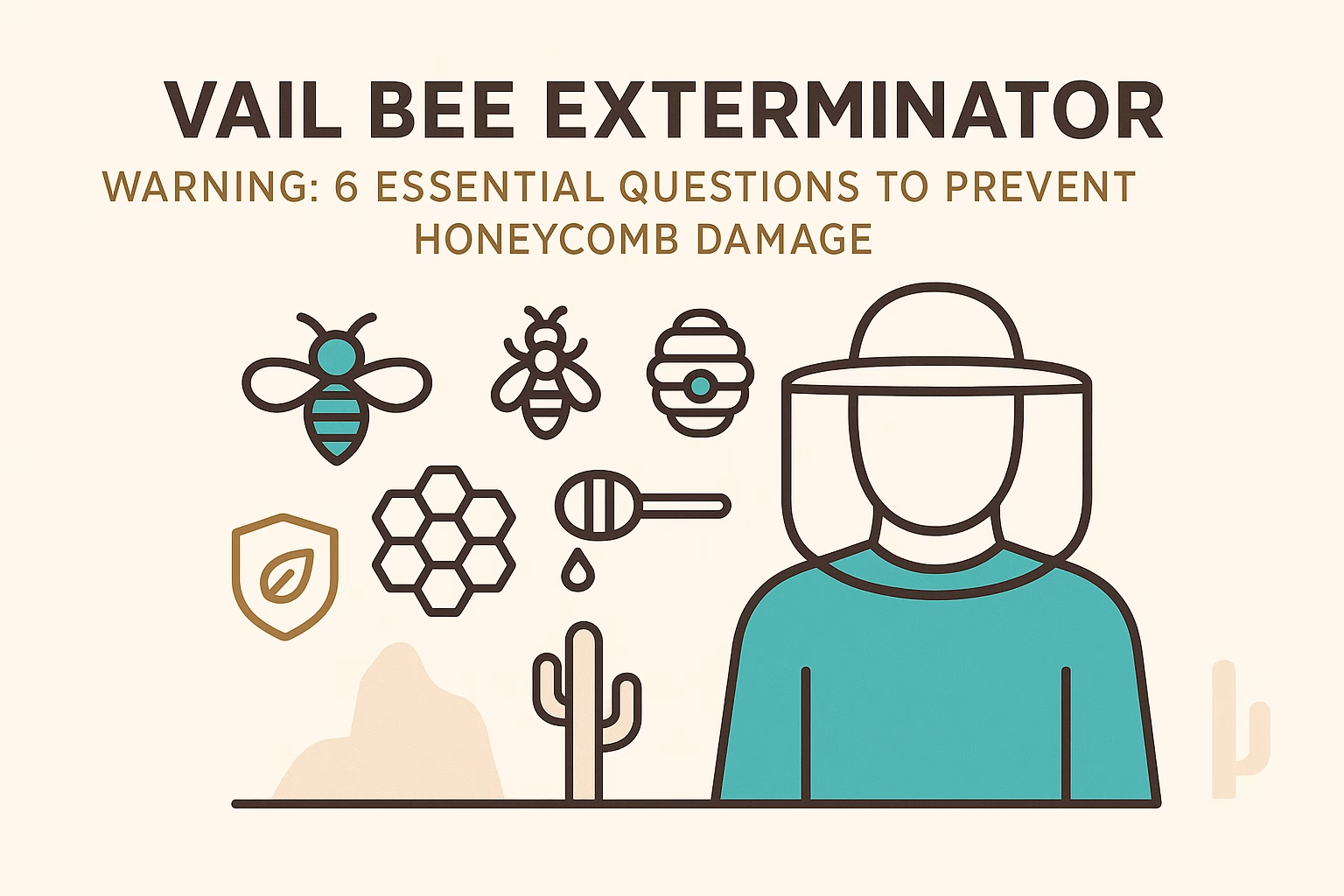Introduction: Looking for a Vail bee exterminator? Why killing bees is a costly mistake
When you urgently search for a Vail bee exterminator, it’s tempting to choose the fastest, cheapest “spray-and-go” option. It feels like a quick fix—until the real costs show up weeks later.
The problem is simple but expensive: killing bees without removing the honeycomb leaves pounds of wax and honey sealed in your walls or attic. In Arizona’s heat, that leftover comb can cause honey leaks, stains, foul odors, ant and roach infestations, and repeat bee problems. By the time the damage is visible, you’re looking at drywall repairs, odor remediation, and more services—often costing far more than professional Vail bee removal done right the first time.
The smart alternative to typical bee extermination Vail AZ homeowners are offered is full live removal with complete comb cut-out, sanitation, and bee-proofing. This approach protects your home from honeycomb damage and prevents re-infestation.
The Vail bee exterminator trap: Spray-only vs. complete comb removal
Swarm vs. established colony—what a Vail bee exterminator might miss
Not all bee situations are the same. A swarm is a temporary cluster of bees that may leave on its own within 24–72 hours. An established colony is a full hive with pounds of wax and honey hidden inside a wall, soffit, or attic. Treating both situations with a “spray-only” mindset is a costly error.
Even universities emphasize this: whether bees are removed alive or killed, all comb must be extracted to prevent fermentation, leaks, and foul odors. See guidance from UC Davis on swarms and colony removal.
Arizona heat and honeycomb damage: why “kill-only” backfires
In Vail’s high temperatures, a dead colony doesn’t just sit quietly—it melts. Honey warms, bursts its cappings, and bleeds into framing and drywall. That leads to stains, strong odors, and structural damage, often weeks after the initial “treatment.”
- Leftover honey and wax attract ants, wax moths, and cockroaches, compounding the problem.
- Hidden honey can wick through materials, leaving sticky, dark stains that require professional remediation.
For a visual breakdown of “meltdown” risks after extermination, review this local guide on honeycomb damage after kill-only treatments. Also see UC Riverside’s guidance on stains and secondary pests tied to melted wax and honey.
Secondary infestations, re-infestation, and structural issues
Spray-only services often become the first of many service calls. Why? Because residual pheromones from abandoned comb continue to draw new swarms to the exact same spot. Meanwhile, ants and roaches find a buffet, and odors intensify as honey ferments.
- Secondary pests: ants, roaches, beetles, wax moths
- Repeat bee problems: incoming swarms seek out the old hive scent
- Structural issues: honey staining, wet insulation, warped wood, softened drywall
University guidance is consistent: cut out all comb and sanitize to prevent odor, staining, and new infestations. See UF/IFAS best practices for removing colonies from structures.
Real-world building failures: how incomplete hive cleanup costs you more
Incomplete hive cleanup and failing to seal entry points are the top reasons homeowners pay for multiple “fixes.” Case studies from extension programs show long-term damage and repeating infestations when comb is left in walls or voids and entrances aren’t sealed. See examples and prevention strategies at Texas A&M’s IPM House: Exterior walls and bees.
Humane Bee Removal & Relocation
Need Safe, Ethical Bee Removal in Tucson?
Seeing a swarm or bees entering a structure? Call now to speak with a Tucson beekeeper for fast, humane bee removal and professional guidance.
Call (520) 300-7233Vail bee exterminator vs. Vail bee removal: cost, process, and outcomes
Cost comparison: “cheap” extermination vs. full Vail bee removal
Spray-only looks affordable—until the “hidden line items” begin:
- Honey leaks and odor remediation
- Drywall repair and repainting
- Pest control for ants, roaches, and moths
- Repeat visits for re-infesting swarms
In contrast, complete Vail bee removal with comb cut-out, sanitation, and bee-proofing costs more up front but prevents expensive follow-up problems. For a breakdown of where “cheap” goes costly, review this hidden-costs comparison of extermination vs. comb removal.
What best-practice Vail bee removal includes (and why it works)
A reputable provider doesn’t just spray. Best-practice Vail bee removal typically includes:
- Live removal when feasible (reduces risk and preserves pollinators)
- Full comb removal (honey, brood, wax—everything)
- Sanitation and pheromone neutralization (so future swarms aren’t attracted)
- Structural repair (replace insulation, restore drywall/roofing to code)
- Bee-proofing at all entry points
These steps mirror the standard-of-care supported by universities. See UF/IFAS guidance on comb cut-out and prompt removal.
Safety first in Arizona’s Africanized honey bee region
Don’t DIY—call trained pros instead of a “spray-and-go” Vail bee exterminator
Southern Arizona has a significant population of Africanized honey bees that can be more defensive around nests. DIY attempts or improper handling can dramatically increase sting risk and liability. The USDA ARS (Tucson) recommends professional response and prevention measures for on-site bees.
If you’re facing aggressive behavior, follow practical safety steps and keep distance until professionals arrive. For local prevention and response tips, see this safety checklist for incidents and hive extraction.
How to choose a Vail bee exterminator who actually prevents honeycomb damage
The 6 questions to ask before you hire
Protect your structure and your budget by interviewing providers. Ask:
- Do you remove all comb? How will you safely access walls/attics?
- What sanitation/deodorization do you use against pheromone odors?
- Do you perform repairs and seal entry points (comprehensive bee-proofing)?
- What warranty do you provide against re-infestation?
- Are you licensed/insured and trained for Africanized bees in Vail?
- Can I review your FAQs on comb removal and bee-proofing? Start with these common questions and answers.
Red flags that signal higher long-term costs
- “We just spray the bees.” No comb removal plan.
- No access repair or bee-proofing after treatment.
- No odor control or warranty against returning bees.
Humane Bee Removal & Relocation
Need Safe, Ethical Bee Removal in Tucson?
Seeing a swarm or bees entering a structure? Call now to speak with a Tucson beekeeper for fast, humane bee removal and professional guidance.
Call (520) 300-7233The step-by-step Vail bee removal process that avoids honeycomb damage
Inspection and mapping the colony
- Confirm swarm vs. established colony.
- Locate comb with thermal imaging or borescope.
- Create a minimally invasive cut-out plan for walls, soffits, or roofing.
Live removal and full comb cut-out
- Whenever feasible, vacuum and relocate live bees humanely.
- Extract all comb—honey, brood, and wax—until the cavity is clean.
- Bag and remove contaminated materials off-site for proper disposal.
Sanitation, odor neutralization, and repairs
- Clean the cavity and neutralize pheromones to prevent new swarms.
- Replace soiled insulation and dry the void to prevent staining and rot.
- Restore drywall/roofing to code with a neat finish.
Bee-proofing to prevent re-infestation
- Seal openings, caulk gaps 1/8” or larger, and repair construction defects.
- Screen attic/gable vents and protect meter boxes, eaves, and soffits.
- Follow USDA ARS prevention guidance to keep bees from re-entering.
Prevention checklist for homeowners and HOAs in Vail, AZ
Seasonal property hardening to avoid calling a Vail bee exterminator again
Every spring and fall, do a quick hardening walk-through:
- Inspect eaves, soffits, meter boxes, stucco cracks, and roof lines.
- Seal gaps 1/8” and larger with appropriate exterior-grade materials.
- Screen attic and gable vents with hardware cloth.
- Eliminate attractants like empty voids and exposed irrigation or utility boxes.
- Schedule periodic bee-proofing inspections before peak swarm season.
For HOA and property managers, plan ahead with clear protocols for safe, compliant removal and prevention. See this overview of commercial and community-area bee removal best practices.
When a Vail bee exterminator is appropriate—and how to do it responsibly
Integrated approach that protects structures and budgets
There are rare situations where extermination is necessary for immediate public safety (for example, a highly defensive colony threatening people or pets). When that happens, insist on an integrated service that includes:
- Treatment to neutralize immediate risk
- Mandatory comb removal and sanitation
- Structural repair and cavity drying
- Comprehensive bee-proofing and a re-infestation warranty
Universities emphasize that nest/comb removal is essential post-treatment to prevent stains, odors, and pests. See guidance from UC Riverside and UC Davis.
Conclusion: Skip the “spray-and-go” Vail bee exterminator—choose complete removal and bee-proofing
Key takeaways: Killing bees without removing comb causes honeycomb damage, odor problems, secondary pests, and repeat infestations. Full Vail bee removal—including comb cut-out, sanitation, repairs, and bee-proofing—is safer and more cost-effective than typical bee extermination Vail AZ shortcuts.
Call to action: Before you hire a Vail bee exterminator, insist on full comb removal and bee-proofing. Get a no-pressure assessment and protect your home, budget, and community with expert Vail bee removal done right.
Don’t let a quick “spray-and-go” visit turn into months of honey leaks, odors, and repeat infestations. Choose full Vail bee removal with comb cut-out, sanitation, and bee-proofing from a licensed pest control pro. Schedule your service now through our secure online booking page and protect your home the right way, the first time.





